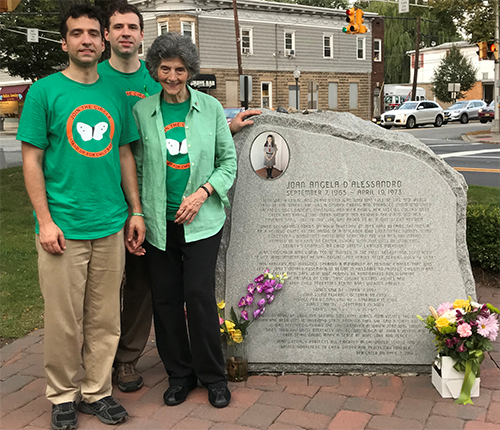 Rosemarie D'Alessandro was 19 when she experienced her first MG symptom. As she ran for the bus one day, her legs gave out.
Rosemarie D'Alessandro was 19 when she experienced her first MG symptom. As she ran for the bus one day, her legs gave out.
It was the first sign of a debilitating illness that would challenge her, but not define her, for the rest of her life. The mother of five from Hillsdale, New Jersey, developed a mental resilience and a passion for social causes that she says have helped her get through even the toughest days.
Those first years with the disease, she didn’t know what was wrong. She often felt foggy in the afternoons, making it hard to focus. After college and graduate school, she became a special education teacher, married, and had her first three children. Her exhaustion worsened.
Seeking answers was challenging.
“I spent eight years looking for a diagnosis,” D’Alessandro says. “Most of the time I was treated as if I was depressed. I was told I had narcolepsy.”
In 1974, after visiting a specialist at Mt. Sinai Hospital in New York, she was diagnosed with myasthenia gravis.
“All this misunderstanding and being judged was hard, but it made me put my feet down on the ground, and say, It’s hard, but you have to keep going.”
This determination helped her contend with both her disease and personal tragedy. In 1973, her seven-year-old daughter Joan was murdered by a neighbor. Joan’s death drove D’Alessandro to fight for a change in criminal law to protect victims’ families and children.
Joan’s Law was passed in New Jersey in 1997 and at the federal level in 1998. The law prohibits parole for anyone convicted of killing a child under 14 in conjunction with a sexual assault.
“I would be working on those laws from bed when I had two hours of strength,” D’Alessandro shares. “Each day I would say, ‘I’ll do five more minutes of phone calls for the law. Tomorrow I’m going to try for five more minutes.’ That gave me a goal and it gave me strength, and when you get mental strength, that helps with physical.”
With the help of her two sons, D’Alessandro started the Joan Angela D’Alessandro Memorial Foundation. Their mission is to promote child safety and advocate for legislation. Today she continues this work from home, as recently as October giving a virtual talk at Fordham University.
D’Alessandro manages her MG through mindfulness, meditation, and holistic medicine, including diet and exercise. She says that she’s still learning about her disease, citing recent MGFA webinars and our virtual conference as helpful and fascinating tools.
Her resiliency is a model for others who are also facing life with MG — or any chronic illness.
“I want people to understand what you can do with MG. It’s really a lot about the mental. The fatigue may want to stop you, but even though you feel like you just want to sit and do nothing, make a little thought in your head, ‘I’m going to rest, and then when I get up I’m going to see what I can do.’”

